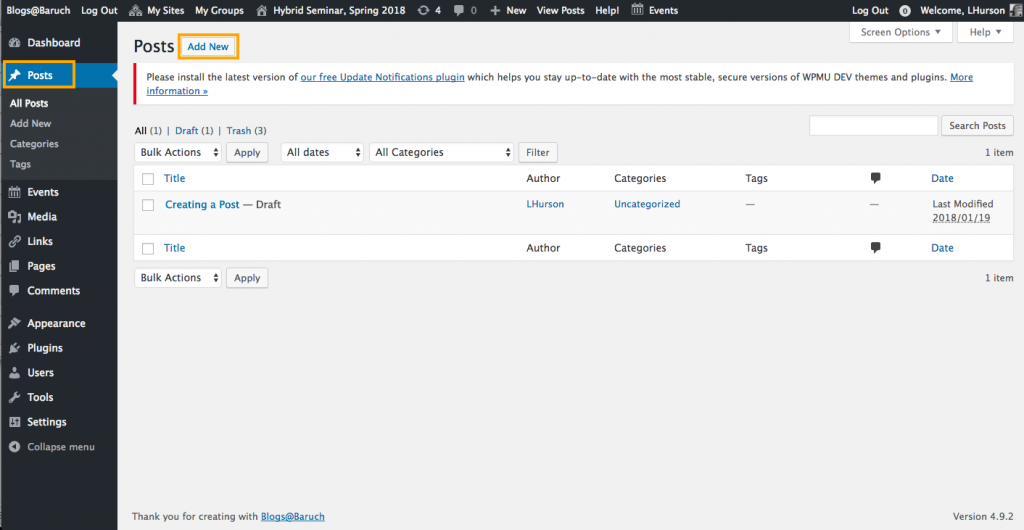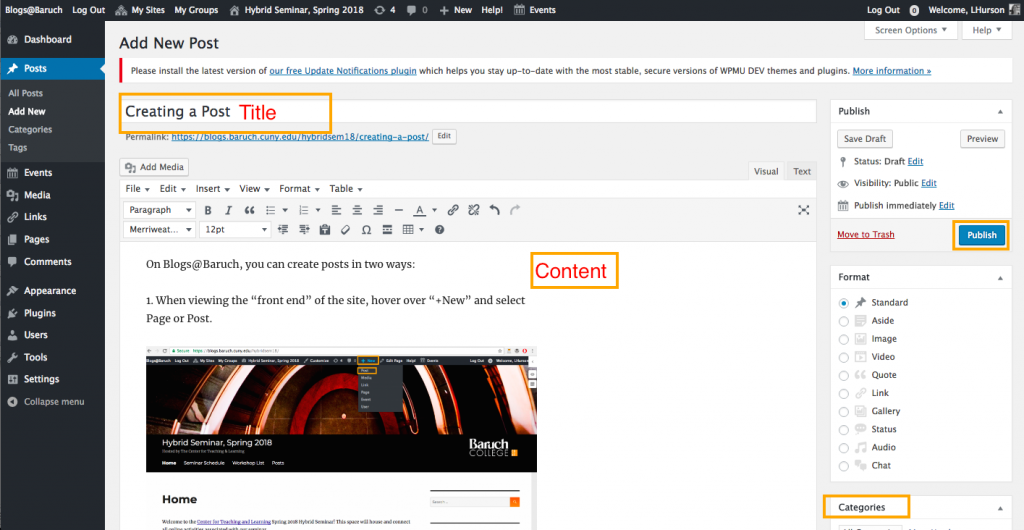Home » Articles posted by Laurie Hurson (Page 3)
Author Archives: Laurie Hurson
Week 2 Prompts
By Tuesday, February 6th: READ
- “What-is-Web-2.0” by Tim O’Reilly in The Social Media Reader, Mandiberg, M. (Eds). New York: New York University Press. Creative Commons, BY SA NC. (2012)
- “Digital” By Tara McPherson, Keywords for American Cultural Studies. NYU Press (2014)
By Thursday, February 8th: Create Post #2: But really, what is Web 2.0? Find an example that demonstrates at least 3 of O’Reilly’s 7 principles. Share your example and describe how it demonstrates the principles of “web 2.o”. Link to your example, if possible. Categorize the post as “Week 2“.
Week 1 Post Prompt
Read: The 5 Cs: “The New Media Technologies: Overview and Research Framework” by Linda Friedman, Hershey Freidman (2008)
Create Post for Week #1: Find and link to an example* of the 5 Cs we discussed in class. Choose a unique title for your post. In your post, describe how your example demonstrates the 5 Cs. End your post with a sentence or two about what you hope to learn in this course. Categorize the post as “Intro to New Media”.
- Directions for Creating a Post HERE
- No duplicate examples – if someone already wrote about your example, please find a new one!
- Categorize your post as “Week 1”
Tech Ethics
Tristan Harris runs the Center for Humane Technology where he, focuses on realigning technology with a clear-eyed model of human nature. And befire that he was a design ethicist at Google where he studied the ethics of human persuasion. The ideas that Harris present are “I think that’s the thing that we both share is that the human mind is not the total secure enclave root of authority that we think it is, and if we want to treat it that way we’re going to have to understand what needs to be protected first.” and that humans are hackable and are being hacked. Which is how your computer (i.e Youtube, Amazon) knows more about you than you know about yourself. Harris stance on technology is realizing that we are vulnerable when it comes to internet and we should acknowledge that, and we should start to question and move into a direction whereas we can protect ourselves from this exposure.He’s stance is “We want society to not be hacked, which goes to the political point and sort of how do we politically mobilize as a group to change the whole industry. I mean, for me, I think about the tech industry.” A quote that stood out to me was “I think the point is that we need a new kind of philosophy that acknowledges a certain kind of thinking or cognitive process or conceptual process or social process that we we want that.” It stands out simply because it says a simple but effective message , lets stop talking and actually do something.A question I would have for him is would he consider teaching a class based off humans being hackable.
Publics
The article “Issues Spark a Public Into Being” is about democracy and how its all about subjects. The article sheds light on how Democracy can be confusing and a little jacked up but it is still beautiful and should be fine tuned. “To acknowledge the role that the problems that affect people playing bringing politics about, does not mean the end of democracy, but its beginning. The appearance of the objects of politics on the scene of democratic politics does not necessarily mean the exit of the democratic subject. Instead of worrying that the complicated issues of today make democracy impossible, we should try to figure out by what amazing means today’s issues may bring out the passions of the public.” Object oriented democratic politics is a little more complicated meaning as people don’t want to be idle in politics but more involved. Number two states that information is not the problem ; she starts off by saying lack of information is a problem but also a solution as well. Meaning the lack of information promotes involvement. “Lippmann and Dewey did not accept the diagnoses that say that the problem of democracy in a technological society is a problem of the quality,organisation and presentation of information.” I think this article pertains to the class because once again it goes back to us having awareness of our activity on the internet , our rights and how e’re being monitored.
Critical Sociology
Adiar Stephen expresses that “The size of the potential market for information commodities is not limited by productive capacity.”. This is supported by Adiar when he states that multiple companies have given away free software in order to have a large market, with increased demand on their products. However, according to Adiar, no matter what the market size is, as long as the item being sold is properly advertised, invested in, as well as targets the global audience standards; there should be no limitations. Microsoft is a commodity that is mass produced yet still is purchased and requested for constantly. Regardless of how much the company produces the software in various forms, it is still needed and purchased in almost everyone’s device because of its efficiency as well as how it is advertised.
Friday Jan 28: Class Cancelled Due to Snow
Please read XYZ
- Link to reading
By Sunday Jan 30th: Create a post to respond to the following Prompts. Categorize the post as “Snow Day”
- What themes are….
Post directions
All posts should be AT LEAST 250 words. You can create posts in two ways:
1. When viewing the “front end” of the site, hover over “+New” and Post.

2. Or, in the dashboard, visit the “Posts” area and click the “Add New” button on the top left.

Once you are in the post editor, add a post title and content. Remember to categorize and tag your post. Once complete, click Publish to make it live!

Reading Response 1
Based on what I have learned so far in class, I would predict that Amazon will expand bigger and unimaginable rapidly in future. Within a short time from an online book store to a website of “everything service”, Amazon has competed with all kind of businesses from retail store, book store, grocery supplier, delivery service, house cleaning service to software and database system like Amazon cloud, Kindle, Echo, Amazon Web Service, etc. We can say that, whatever we need from other businesses, we can find it from Amazon.
Accordion Test
What is an Accordion Menu?
It is a type of menu that allows you to show or hide a question/answer, idea/explanation, etc.



